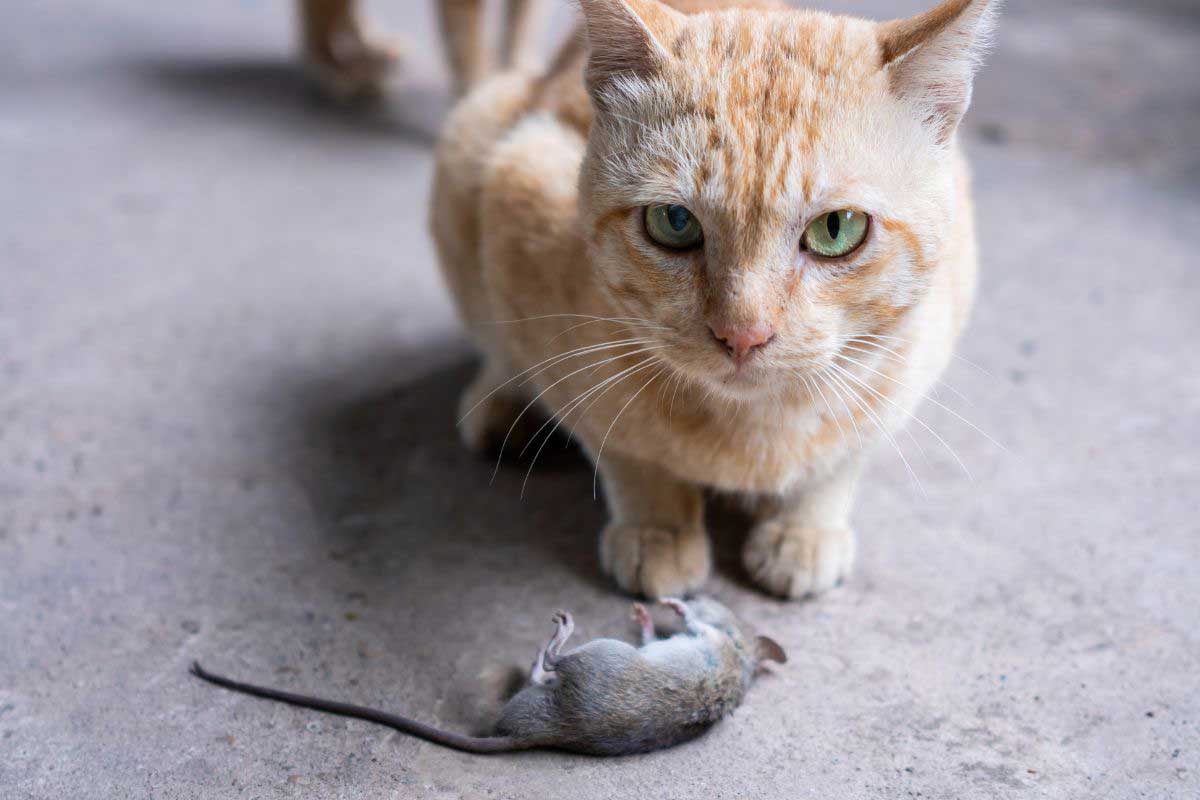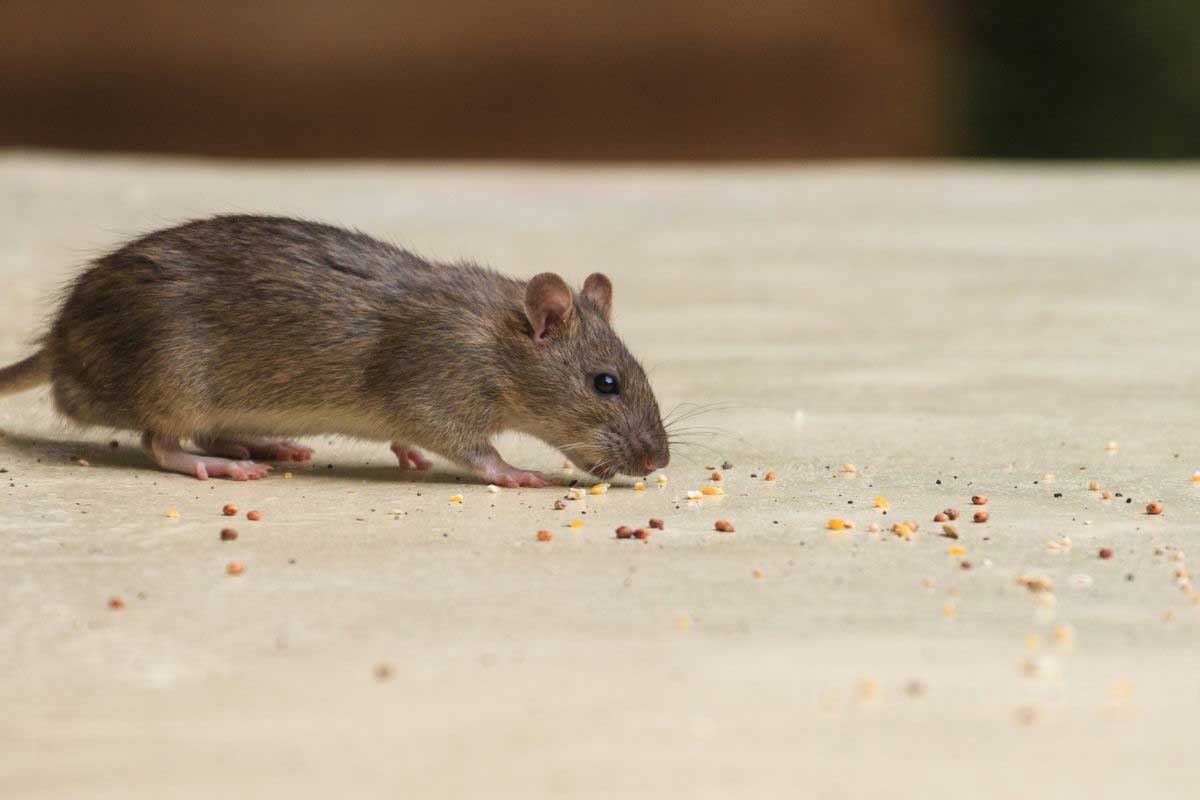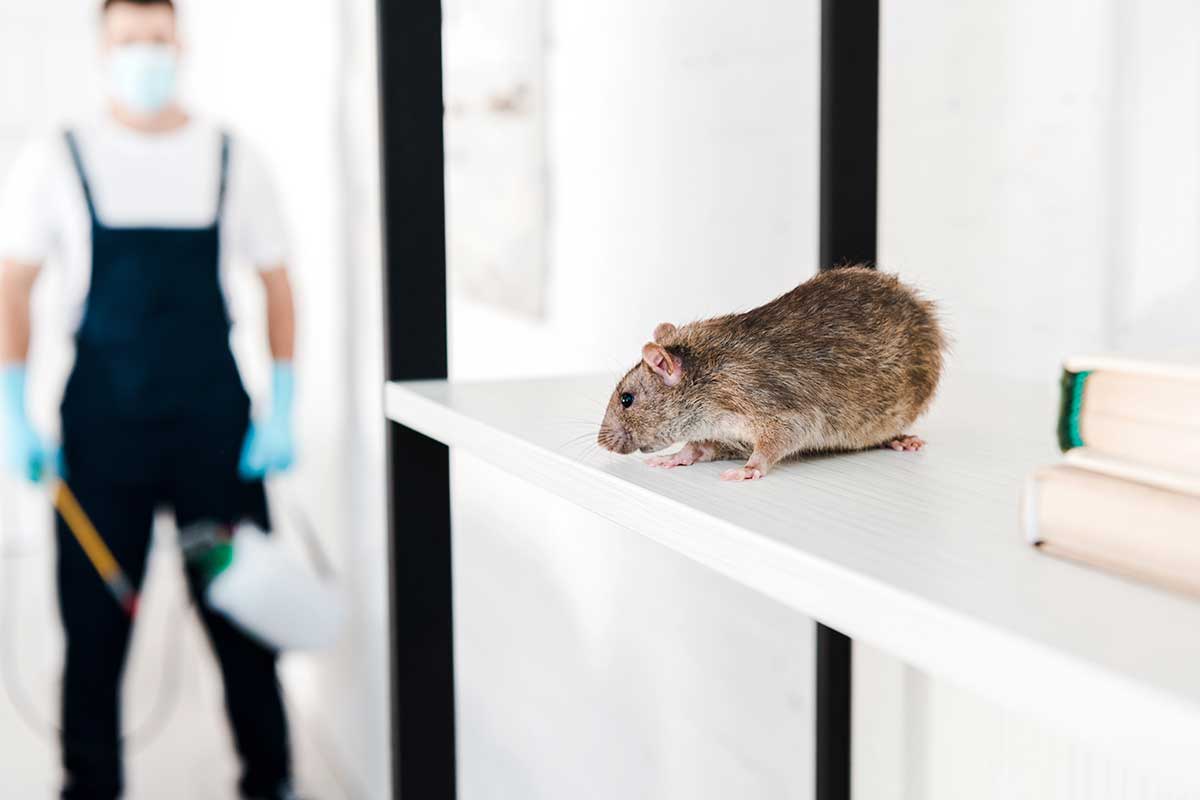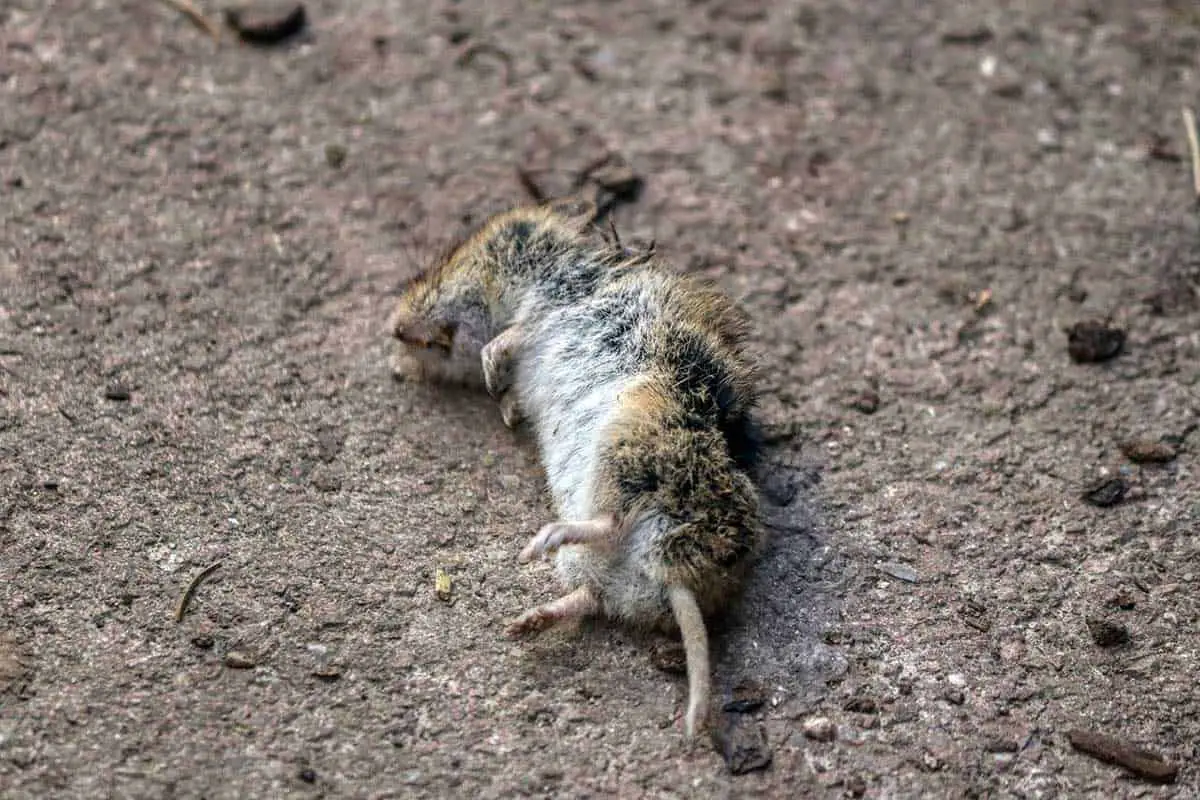This page may contain affiliate links. If you click and buy, we might get a small commission at no cost to you.
If you have mice in your house, a mouse bait can be an effective solution. However, you can’t prevent the mouse from dying in an unknown location, such as in the walls or heating duct. The problem is you’re left with an odor that can be unbearable. So, how do you get rid of dead mouse smell when you can’t find it?
Luckily the smell shouldn’t last for more than 10 or 14 days. During that time, here are tips to minimize the intense smell so you can live peacefully in your home.
How to get rid of dead mouse smell when you can’t find it
Even if you can’t remove the dead mouse carcass, there are ways to make the smell more bearable. Here are 9 tips you can mix and match to help freshen up your space.
1. Use charcoal to absorb smells
Charcoal is extremely porous and able to trap odors instead of simply covering them up. You can easily purchase charcoal deodorizer bags to place around your home or hang along the walls.
If you’re opting for lumps of coal, make sure you use natural briquettes. They don’t have any chemicals that will interfere with the ability to absorb smells. Don’t just throw the charcoal around your room because it can easily stain surfaces. Place them in a metal tray or container and leave them near where the smell is worst.
2. Put out containers of vinegar
You might think vinegar has a strong smell, but it’s much more pleasant than dead mouse odors. Additionally, using vinegar will help absorb any odors lingering in the room. You can place containers or cups of vinegar around the area that smells the most. The vinegar smell will easily air out of your home in a few days.
3. Use baking soda
Baking soda helps reduce odors in the air because the odor molecules react to the baking soda and get absorbed. While it’s an effective method, it could take a couple of days before the smell is completely absorbed. You can place tubs of baking soda around the house or turn it into a spray. Just mix it with water and spray around the areas with the most smell.
4. Repurpose dried coffee grounds
Not only do coffee grounds have a nice smell on their own, but you can also use them to absorb smells in a room. It contains nitrogen which helps clean up the sulfur in the air quickly and safely through absorption. Place the grounds in a container around the room or place them in mesh bags to create sachets of coffee grounds.
5. Use dead animal deodorizers
There are deodorizer products available that are specially made to cover up dead animal odors. The products typically come in pouches or as liquids you can put in a spray bottle. You can also purchase non-toxic industrial odor eliminators that can be applied dry or mixed in water.
Suppose the smell is coming from your walls. In that case, you can try stuffing cotton balls covered in deodorizers under cracks between the baseboard and floor or into holes in the wall.

6. Air out your home
You can reduce the intense smell of the dead mouse by increasing ventilation in the room where the smell is most intense. Open windows to let fresh air in and the odor out. Place a fan in the room and one by the window to help circulate air and blow air out.
You can also install an air ventilation system. They help improve the quality of indoor air, including to help with circulation and to reduce any foul odors.
7. Get an air purifier
Air purifiers help remove odor particles from the air by trapping them inside the machine. While they can be more expensive than air ionizers, they are more effective when you want to remove a smell, not just cleanse the air. For the best results, purchase an air purifier with a carbon filter that can work well in large rooms.
8. Use aromatic products
Aromatic products such as air fresheners, essential oils, candles, and incense sticks are quick and easy solutions to mask the smells of dead mice. Incense sticks or essential oil diffusers typically work faster in filling up a room.
Do note, though, that some people might find the combination of dead mouse smell and aromatics more sickening. Try to stick to smells such as peppermint, eucalyptus, or lavender. Or choose a strong aroma you know you prefer.
9. Try again to locate the dead mouse
While a dead mouse can be hard to find, you shouldn’t give up on the search completely. You might be able to locate the mouse, remove its body, clean up the area and eliminate the smell faster.
Look for visual clues to find where the mouse was, including droppings, streaks on surfaces, and chewed items. You’ll also want to check common hiding places, such as:
- Cupboards
- Closets
- Attics
- Under floorboards
- Crawl spaces
- Air ducts
- Under sofas
What if you find the dead mouse?
If you manage to find the dead mouse, getting rid of it properly is key to eliminating the smell and preventing bacteria from spreading. Here’s what you need to do:
Put on disposable gloves and a mask before handling the carcass. Mice can carry bacteria and diseases, so you want to avoid direct contact. Use paper towels or a plastic bag to pick it up, being careful not to squeeze or crush it. Place the mouse into a sealed plastic bag, then put that bag into a second one to contain any odor and prevent leakage.
For disposal, the best option is to toss it in a sealed outdoor trash bin—never your kitchen or bathroom garbage, as the smell will linger indoors. If you have a yard, you can bury it at least a foot deep to prevent scavengers from digging it up. Some local waste services offer dead animal disposal, so check with them if you’re dealing with multiple mice. Never flush a dead mouse down the toilet—this will cause serious plumbing issues. And don’t compost it, as rodents can carry harmful bacteria that shouldn’t mix with garden soil.
Once the mouse is gone, you’ll need to clean the area where it was found. Use a disinfectant spray, bleach solution, or vinegar to sanitize the space. If it was on a porous surface like fabric or wood, let the cleaner soak in before wiping it up. To finish, take out the trash immediately and wash your hands thoroughly.
How long does the smell last?
The lingering odor from a dead mouse can last anywhere from a few days to several weeks, depending on conditions in your home. Warm, humid environments speed up decomposition, meaning the smell peaks quickly but also fades faster. In cooler, drier areas, the process takes longer, and the odor can stick around for weeks.
Ventilation makes a huge difference—a closed-up space traps the smell, while good airflow helps clear it out. If the mouse is inside a wall or duct, the stench will take longer to disappear since the carcass is decomposing in an enclosed space. Using odor-absorbing materials like charcoal, baking soda, or vinegar can help reduce the intensity, but the smell won’t fully go away until decomposition is complete.
Keeping Mice Out for Good
Getting rid of the smell is one thing, but if you don’t seal up entry points and stay on top of the problem, you’re just inviting new mice to move in. Rodents are opportunists—if they’ve found a way into your home once, chances are they’ll try again. That’s why long-term prevention is just as important as dealing with the immediate issue.
Seal Up Entry Points
Mice can squeeze through gaps as small as a dime, so even the tiniest cracks around your home can become an open door for them. Walk around your house—inside and out—and check for any potential entry points. Pay extra attention to:
- Gaps around pipes, vents, and utility lines
- Cracks in the foundation or siding
- Holes in walls, baseboards, and under cabinets
- Spaces around doors and windows
Use steel wool and caulk to seal small holes—mice can’t chew through it. For larger gaps, use metal mesh or hardware cloth. Expanding foam sealant might seem like a good idea, but mice can gnaw right through it, so don’t rely on that alone. We actually used some stuff like this expanding foam to seal up a lot of cracks and holes, it’s inexpensive and it fills large gaps with ease.
Set Traps to Confirm They’re Gone
Even after sealing up your home, don’t assume the problem is solved just yet. Keep traps set for several weeks to make sure no stragglers are left behind. If you haven’t caught anything after a few weeks, you might finally be in the clear.
For maximum effectiveness:
- Place traps along walls, behind appliances, and near suspected entry points—mice like to stick to edges when moving around.
- Use a variety of traps—snap traps, bait stations, and live traps all have their place.
- Check traps daily—a mouse that dies in a trap and goes unnoticed will put you right back where you started.
Stay Vigilant and Watch For New Mice

Mice are hardwired to seek out warm, safe places with easy food access, and human homes fit the bill perfectly. Just because you haven’t seen one in a while doesn’t mean they won’t come back. Stay ahead of the problem by:
- Keeping food sealed in airtight containers—don’t leave pet food or birdseed out overnight.
- Regularly inspecting common hiding spots—attics, basements, and crawl spaces are prime rodent real estate.
- Checking for new signs of activity—look for droppings, gnaw marks, or fresh burrowing near entry points.
If you’ve done everything right—sealed up holes, set traps, and haven’t caught anything in weeks—you’re probably in the clear. But don’t get overconfident. Mice are always looking for a way back in. The best thing you can do is stay proactive so you don’t have to deal with the smell of another dead one anytime soon. We recently dealt with a mouse problem at our house and used several of the products recommended on this page to mouse-proof our house the best we could without calling in a professional, fingers crossed but they are gone!
When to Call in a Pro
Sometimes, no matter how much effort you put into sealing up holes, setting traps, and eliminating odors, mice keep coming back—or worse, you can’t even find where the smell is coming from. That’s when it’s time to bring in a professional exterminator.
Signs You Need Professional Help
You might be able to handle a one-time mouse issue on your own, but if you’re dealing with any of the following, it’s best to call in the pros:
- The smell won’t go away – If the stench is lingering for more than a few weeks, the dead mouse might be stuck in an inaccessible place, like inside a wall, duct, or crawl space. A pro can locate and remove it.
- You keep catching mice – If your traps are still catching mice weeks after sealing entry points, there’s likely an established infestation with a hidden nest.
- You hear scratching or movement in the walls – This usually means mice haven’t just passed through—they’re living there.
- Damage is getting worse – Chewed wires, gnawed furniture, or holes in food packaging mean mice are still active, and they won’t stop until they’re forced out.
- You’ve tried everything and they keep coming back – If you’ve sealed up holes, set traps, and removed food sources but mice still return, they might be entering from areas you can’t see.
What a Professional Can Do

A pest control expert does more than just set better traps—they know exactly where to look for nests, burrows, and hidden entry points. They can:
- Find and remove dead mice stuck in walls or hard-to-reach areas.
- Use industrial-grade odor eliminators to get rid of lingering smells.
- Seal up entry points more effectively than DIY solutions.
- Determine if you have a larger infestation and use targeted treatments to eliminate it.
- Give expert advice on long-term prevention so you don’t end up dealing with this problem again.
Final Thoughts
If you’re just dealing with one dead mouse and an occasional sighting, you can probably handle it on your own. So buy some traps and some things to help you seal up your home first. But if you’re constantly battling new mice after this, can’t find the source of the smell, or suspect a full-blown infestation, it could be time to call in a professional. The longer you wait, the worse the problem will get—so if in doubt, bring in the experts before your home turns into a mouse hotel.




